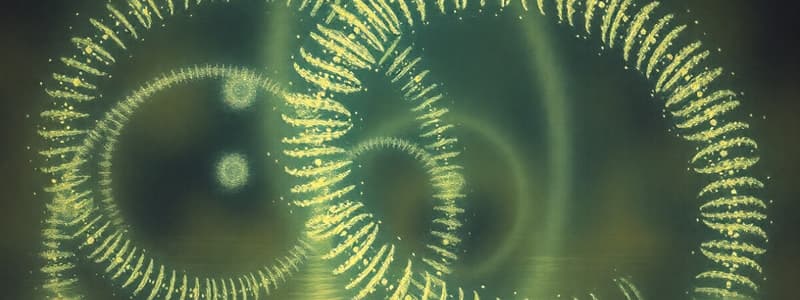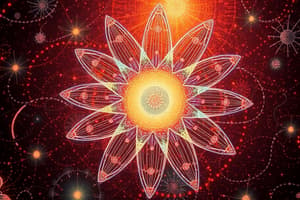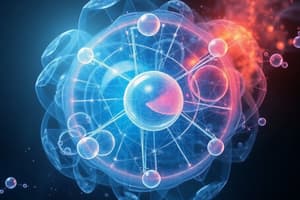Podcast
Questions and Answers
What does the term 'matter' refer to in physics?
What does the term 'matter' refer to in physics?
- Substances that occupy space and have mass (correct)
- Any element on the periodic table
- Any chemical reaction
- Only solid substances
Which of the following best describes density?
Which of the following best describes density?
- Weight of the substance
- Mass multiplied by volume
- Volume divided by mass
- Mass per unit volume (correct)
What happens to mass during the burning of a substance?
What happens to mass during the burning of a substance?
- It transforms into a different state
- It is conserved, forming ash, smoke, and gas (correct)
- It disappears completely
- It is lost as heat energy
Which of the following states of matter is compressible?
Which of the following states of matter is compressible?
Which particles primarily contribute to the mass of an atom?
Which particles primarily contribute to the mass of an atom?
What primarily constitutes the mass of an atom?
What primarily constitutes the mass of an atom?
Which interaction is the weakest on the atomic scale?
Which interaction is the weakest on the atomic scale?
What is the charge of an ion that has gained electrons?
What is the charge of an ion that has gained electrons?
What defines a chemical compound?
What defines a chemical compound?
How do isotopes of the same element differ from each other?
How do isotopes of the same element differ from each other?
What distinguishes a compound from a mixture?
What distinguishes a compound from a mixture?
What can be inferred about the size and mass of different atoms?
What can be inferred about the size and mass of different atoms?
Which of the following statements about molecules is true?
Which of the following statements about molecules is true?
What is the primary characteristic of a compound?
What is the primary characteristic of a compound?
Which of the following is an example of a molecule?
Which of the following is an example of a molecule?
Which term describes an atom that has a positive charge?
Which term describes an atom that has a positive charge?
What determines the identity of an element?
What determines the identity of an element?
What features of the outer shell of electrons influence an element's electrical properties?
What features of the outer shell of electrons influence an element's electrical properties?
How is the Periodic Table organized?
How is the Periodic Table organized?
What is the atomic number of lead (Pb)?
What is the atomic number of lead (Pb)?
What characterizes an element?
What characterizes an element?
What is true about the relationship between protons and electrons in an atom?
What is true about the relationship between protons and electrons in an atom?
What does the atomic mass of an element represent?
What does the atomic mass of an element represent?
Where are electrons located in relation to the nucleus?
Where are electrons located in relation to the nucleus?
Which of the following is an example of a molecule consisting of two atoms of the same element?
Which of the following is an example of a molecule consisting of two atoms of the same element?
What characteristic distinguishes a mixture from a compound?
What characteristic distinguishes a mixture from a compound?
How does temperature relate to molecular activity?
How does temperature relate to molecular activity?
Which of the following statements about metal alloys is correct?
Which of the following statements about metal alloys is correct?
What do the subscripts in a chemical formula indicate?
What do the subscripts in a chemical formula indicate?
Which of the following is not a characteristic of a molecule?
Which of the following is not a characteristic of a molecule?
In which of the following examples is the substance a mixture?
In which of the following examples is the substance a mixture?
Which of the following best describes the relationship between molecular movement and states of matter?
Which of the following best describes the relationship between molecular movement and states of matter?
What characterizes a solid state of matter?
What characterizes a solid state of matter?
What occurs to a substance when heat is applied to a solid?
What occurs to a substance when heat is applied to a solid?
What process converts a liquid into a gas?
What process converts a liquid into a gas?
At what temperature does water boil at standard sea level pressure?
At what temperature does water boil at standard sea level pressure?
Why do gases flow more easily than liquids?
Why do gases flow more easily than liquids?
Which of the following statements about matter is true?
Which of the following statements about matter is true?
What describes the bonds between molecules in solids?
What describes the bonds between molecules in solids?
How does applying heat to a liquid affect its molecules?
How does applying heat to a liquid affect its molecules?
At an altitude of 18,000 feet, what is the approximate boiling point of water?
At an altitude of 18,000 feet, what is the approximate boiling point of water?
Which of the following states of matter is typically the least dense?
Which of the following states of matter is typically the least dense?
What primarily determines the density of a substance?
What primarily determines the density of a substance?
Which of the following statements about the behavior of solids is true?
Which of the following statements about the behavior of solids is true?
How does the volume of solids compare to that of liquids and gases when subjected to temperature changes?
How does the volume of solids compare to that of liquids and gases when subjected to temperature changes?
Which measurement units can be used to express density?
Which measurement units can be used to express density?
What happens to the molecules in a solid as temperature is increased?
What happens to the molecules in a solid as temperature is increased?
Which type of matter typically expands or contracts more readily under pressure changes?
Which type of matter typically expands or contracts more readily under pressure changes?
Flashcards
What is matter?
What is matter?
Anything that takes up space and has mass.
What is volume?
What is volume?
The amount of space an object takes up.
What is mass?
What is mass?
The amount of matter in an object.
What is density?
What is density?
Signup and view all the flashcards
What are elements?
What are elements?
Signup and view all the flashcards
What is an atom?
What is an atom?
Signup and view all the flashcards
What is a molecule?
What is a molecule?
Signup and view all the flashcards
What is a chemical compound?
What is a chemical compound?
Signup and view all the flashcards
What is the nucleus?
What is the nucleus?
Signup and view all the flashcards
What is a proton?
What is a proton?
Signup and view all the flashcards
What is an electron?
What is an electron?
Signup and view all the flashcards
What is an element?
What is an element?
Signup and view all the flashcards
What is the atomic number?
What is the atomic number?
Signup and view all the flashcards
What is the periodic table?
What is the periodic table?
Signup and view all the flashcards
What are electron shells?
What are electron shells?
Signup and view all the flashcards
What is the valence shell?
What is the valence shell?
Signup and view all the flashcards
Solid
Solid
Signup and view all the flashcards
Liquid
Liquid
Signup and view all the flashcards
Gas
Gas
Signup and view all the flashcards
Melting
Melting
Signup and view all the flashcards
Vaporization
Vaporization
Signup and view all the flashcards
Molecular Attraction
Molecular Attraction
Signup and view all the flashcards
Motion Energy
Motion Energy
Signup and view all the flashcards
Boiling Point
Boiling Point
Signup and view all the flashcards
How are subscripts used in chemical formulas?
How are subscripts used in chemical formulas?
Signup and view all the flashcards
What is a mixture?
What is a mixture?
Signup and view all the flashcards
What is a heterogeneous mixture?
What is a heterogeneous mixture?
Signup and view all the flashcards
What is a homogeneous mixture?
What is a homogeneous mixture?
Signup and view all the flashcards
How does molecular activity relate to temperature?
How does molecular activity relate to temperature?
Signup and view all the flashcards
What is a compound?
What is a compound?
Signup and view all the flashcards
What is a metal alloy?
What is a metal alloy?
Signup and view all the flashcards
What are isotopes?
What are isotopes?
Signup and view all the flashcards
What is an atomic mass unit (amu)?
What is an atomic mass unit (amu)?
Signup and view all the flashcards
What is an atomic mass?
What is an atomic mass?
Signup and view all the flashcards
What is chemical bonding?
What is chemical bonding?
Signup and view all the flashcards
Density
Density
Signup and view all the flashcards
States of Matter
States of Matter
Signup and view all the flashcards
Density of Solids & Liquids
Density of Solids & Liquids
Signup and view all the flashcards
Density of Gases
Density of Gases
Signup and view all the flashcards
Volume Change
Volume Change
Signup and view all the flashcards
Compressibility of Solids
Compressibility of Solids
Signup and view all the flashcards
Compressibility of Liquids
Compressibility of Liquids
Signup and view all the flashcards
Compressibility of Gases
Compressibility of Gases
Signup and view all the flashcards
Study Notes
Matter
- Matter is a general term for all substances.
- Matter occupies space and has mass.
- The volume of a substance is the amount of space it occupies.
States of Matter
- Matter exists in three states: solid, liquid, and gas.
- Solids have a definite shape and volume.
- Liquids have a definite volume but take the shape of their container.
- Gases have no definite shape or volume, taking the shape and volume of their container.
- Changes of state can occur by altering molecular activity.
Atomic Structure
- Almost all of an atom's mass is concentrated in the nucleus (protons and neutrons).
- The nucleus is very small compared to the atom.
- Protons have a positive electric charge.
- Electrons have a negative electric charge.
- Neutrons have no electric charge.
- The number of protons is unique to an element.
Elements
- An element is matter in which all the atoms or molecules are identical.
- Elements are detailed in the Periodic Table.
- For example, pure Copper is an element because it is comprised of Copper atoms.
- Elements retain their properties as atoms.
- The periodic table displays all known elements in order of their atomic number.
- Atomic number corresponds to the number of protons in the atom.
- Atomic Mass is the average mass of the element expressed in atomic mass units (amu). Atomic Mass is the mass of the protons and neutrons only.
- Electrons are in shells around the nucleus. The number of electrons in the outermost shell determines some of the elements' electrical properties
- Atomic number = number of protons
- Number of protons = number of electrons
Molecules and Compounds
- Atoms combine to form molecules.
- Matter made of different elements is called a compound. Elements combined in specific ratios.
- Molecules are the smallest particle of an element or compound that can still retain the element's properties.
- Molecules of atoms of the same element can exist or atoms of different elements. Molecules can have just one or more than one atom.
- Molecules have forces of attraction that affect their state (e.g., solid, liquid, gas). These forces affect how molecules move.
Density
- Density is the mass per unit volume (m/V).
- Solids are usually more dense than liquids (but not always).
- Gases are less dense.
Mixtures
- A mixture is composed of two or more substances that retain their individual characteristics.
- Mixtures can be separated into the original substances.
- Mixtures can have various ratios of elements.
- Examples of mixtures include salty water, air, and metal alloys.
Temperature and State Changes
- Temperature is a measure of molecular activity.
- Temperature increase causes the molecules to gain energy leading to changes of state such as melting. Increase in temperature leads to more molecules moving freely.
- When molecules gain sufficient energy due to heat they can break free of an existing state, resulting in a change of state. (e.g., liquid to gas, or solid to liquid)
Volume (Solids, Liquids, Gases)
- Volume is the amount of space occupied by a substance.
- Solids are the least likely to change volume compared to liquids or gases.
- Liquids change volume more easily than solids when temperature is altered.
- Gases change volume most easily compared to solids or liquids when experiencing temperature or pressure changes.
Ions
- An ion is an atom that has gained or lost electrons leading to a postive or negative charge.
- The charge is determined by the atoms difference in the number of electrons compared to protons.
Isotopes
- Isotopes are atoms of the same element, but with different numbers of neutrons.
- The atomic number (number of protons) is the same but atomic mass differs.
- Not all isotopes are radioactive.
Studying That Suits You
Use AI to generate personalized quizzes and flashcards to suit your learning preferences.




